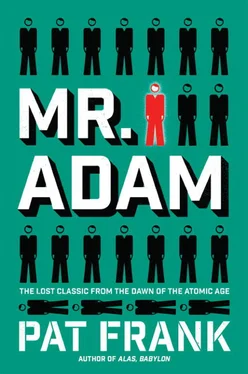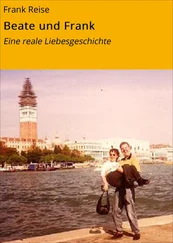“Yes, I get it,” said Homer, and sighed.
I looked up, and there was Oscar Finney, with The Frame. Her breasts looked round as radar globes, and she was tuning them on Homer. You can’t chase old friends away from your table, and I did the introductions, but I told myself I wasn’t having any more rye, because now was the time for all good men to be alert.
Kitty Ruppe, or Kathy Riddell, or The Frame—whatever you want to call her—was either a very smart girl (which at the time seemed doubtful) or she had been carefully coached. Anyway, apparently those radar globes told her something, because she began talking archeology. She had read in the papers how Homer intended being an archeologist, when he was young, and so there was a bond between them.
“Oh,” said Homer, “are you interested in archeology?”
Indeed she was, The Frame replied. Had Homer ever heard of Professor Ruppe, at the University of Chicago? Well, that was her father.
Homer hesitated, and then he said he thought the name sounded familiar, and wasn’t he connected in some way with the Aztec excavations? Absolutely, said The Frame, and she herself was particularly interested in archeology in Mexico, and she was simply fascinated by the finds in the Temple of Huitzilopochtli. Homer said he was too.
It was quite the queerest supper club conversation I remember, but it only made me more suspicious. This plant smelled all the way to the top of the Washington Monument. No dope, he, my friend Oscar Finney. To hook the name of any actress to Homer Adam was worth how many columns? How many papers are there in the United States?
Presently I saw it was coming. It approached in the shape of one of those “house” photographers you will find in night clubs and places like the Blue Room. She wore a blue evening gown that matched the decor, and the camera she held in her hand, flash bulb attached, seemed incongruous as a debutante toting a forty-five. She asked us to move a little closer together. When she raised her camera I let my right arm slide around the back of The Frame’s chair. Nobody noticed, except Finney. The flash came, the girl drifted away, and Finney said:
“Steve, you’ve got an evil and suspicious mind.”
“Just careful,” I said.
Homer and The Frame looked at us, not understanding, and then their conversation went back to Mexico. Oscar and I talked shop, and I fed Homer drinks. It was a necessary adjunct to my program of relaxation. You could almost see the layers of repression scale off his shoulders as the drinks took hold, and his interest mounted in The Frame—or her archeology. Two tables away I saw Senator Fay Sumner Knott. She had been sitting there all the time, but I did not notice her until she began to move, in the same way that a snake seems part of the ground until it bunches itself to strike.
Of course you know Senator Knott. When she was nineteen she was the most beautiful debutante in New York, when she was twenty-five she was the loveliest young matron in London, and at thirty she was the smartest divorcée in Rhode Island, both in brains and looks. When she was thirty-five she married the President of Executive Trust, thereby becoming the most beautiful, the brainiest, and almost the richest woman in the world. At least, that was her opinion. When Executive Trust died she dipped a dainty toe into the mud puddle of politics, and lo, there she was in the Senate.
Fay kept looking at Homer, but Homer kept his eyes on The Frame. Presently Fay rose and walked past our table, slim and magic as a wand, but holding her chin tip-tilted to erase the lines in her neck. She ignored The Frame as if her chair were vacant, smiled at Homer, nodded at me, and just at the proper distance—close enough so that we could hear but it would not be heard at other tables—said: “That stupid little bitch!”
The Frame started out of her chair like a leopardess, but Oscar grabbed her, and anyway Fay had already reached the door. I knew she was trouble—big trouble. Homer was white, and his bony hands were shaking. Oscar said: “What a pleasant job you’ve got, Steve! What a nice, uncomplicated, pleasant job!”
Wasn’t it, I agreed. I signed the check, herded Homer to an elevator, and led him to his bedroom in the distinguished guest suite. I helped him undress, fed him a couple of aspirins, made him drink two glasses of carbonated water, and rolled him into bed. His feet stuck a half-foot over the end, but there was nothing I could do about it.
Before I opened my eyes, the next morning, I could smell coffee, and for some time there seemed no doubt that I was in Smith Field, and that Marge had wakened me first. I didn’t hear coffee bubbling, however, nor did I hear the radio, nor did Marge tickle me behind the ears, the way she usually did when it was time to get up. I just smelled coffee. I opened my eyes and discovered that I was in the Adam suite, but that something new had been added.
I won’t describe her the way she first appeared to me, because that would be unfair. I will describe her the way she was, and is. Jane Zitter, in her way, is a wonderful girl. Wonderful. It is true that she is not beautiful, in the sense that The Frame is beautiful, or Fay Sumner Knott is beautiful, or Marge is beautiful. She has something beyond regular features, a perfect complexion, or streamlined legs. Jane Zitter is part of the workaday world. She is as much a part as a freighter that carries its seven thousand tons of grain at a steady eight knots. No glamour, just service.
She is a little person all around. She isn’t very tall, and she isn’t filled out in the right places. About the best you can say for her clothes is that they are neat, and her thick glasses make her eyes larger and rounder than they actually are, so that she appears perpetually startled.
She’ll never get to be a secretary to a Secretary to the President. She is simply a lubricant for the wheels of government. When the oil becomes gritty with age it is changed, and nobody knows what happens to the old and cracked and tired oil. All that matters is that the wheels still turn.
I opened my eyes and Jane shoved a cup of coffee at me, black. “I suppose you wonder who I am,” she began.
“Oh, no! Not at all! I expect to wake up with strange females in my bedroom.”
“Mr. Smith, I hope I didn’t make a mistake. I’m your secretary. My name is Jane Zitter and I’m your secretary and everything was piling up so that I thought it best that if Mr. Smith wouldn’t go to the office then the office had better go to Mr. Smith.”
I told her I thought this was very nice of the office, and it was an arrangement of which I approved, particularly if the office appeared with black coffee. “But I really don’t see why I have to have an office at all,” I added. “You see, I’m not a real executive of N.R.P. I’m just a sort of glorified nurse-maid.”
Jane turned her startled eyes on my red pajamas. “But if you didn’t have an office, how would you answer your mail, and your telegrams, and dictate your memoranda?”
“I’m not going to dictate any memoranda,” I said firmly. “Not a one.”
“But you have to dictate memoranda,” Jane said. “People write you memoranda, and you have to write them back. Why, already you’ve received a whole envelope full, and I’ve got them with me, in case you care to work here. You see, you’re quite an important man, Mr. Smith, being Special Assistant to the Director, and so you get copies of all the really important memoranda that originate in National Re-fertilization, plus the important inter-office and inter-departmental memos, even those classified secret and top secret.”
I could see she was genuinely serious, and so I decided to be serious too because I didn’t want my secretary to have any delusions that I was a Klutz, or even a half-Klutz. “Look, Miss Zitter,” I said, pushing myself up in bed, “under no circumstances—not ever—will I write a memorandum to anyone about anything. That is a pledge. May God strike me dead if I do!”
Читать дальше












